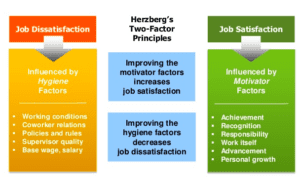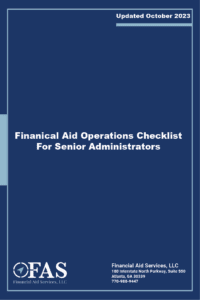Update title :Interview with Dawn
As part of our Leadership series, FAS is thrilled to present an in-depth conversation with Senior Consultant Dawn Patak, Ed. D. at Financial Aid Services, LLC. Her research microscopes staffing shortage issues in higher education, specifically within financial aid, and hypothesizes retention strategies in hopes of generating discussion around the consistent shifts in Higher Education.
 Dawn Patak is a financial aid professional with over 25 years of experience. My financial aid career began as a financial aid counselor at Alfred University. Over the years, I ascended the ranks, moving into assistant and associate director positions at Keuka College, the University of Rochester, and Hobart and William Smith Colleges. I also held a relationship management role with the New York Higher Education Services Corporation (HESC). I worked as an independent contractor consultant with Financial Aid Services in 2016-17 and 2021-22 in between permanent positions as Director of Financial Aid at Finger Lakes Community College, Baltimore City Community College, and Hobart and William Smith Colleges. I recently came back to FAS as a Senior Consultant in August 2023.
Dawn Patak is a financial aid professional with over 25 years of experience. My financial aid career began as a financial aid counselor at Alfred University. Over the years, I ascended the ranks, moving into assistant and associate director positions at Keuka College, the University of Rochester, and Hobart and William Smith Colleges. I also held a relationship management role with the New York Higher Education Services Corporation (HESC). I worked as an independent contractor consultant with Financial Aid Services in 2016-17 and 2021-22 in between permanent positions as Director of Financial Aid at Finger Lakes Community College, Baltimore City Community College, and Hobart and William Smith Colleges. I recently came back to FAS as a Senior Consultant in August 2023.
I have a Bachelor of Science in Economics and Management Science from the State University of New York (SUNY) Cortland and a Master of Science in Education in College Student Development from Alfred University. In May of 2023, I finished my Ed.D. in Leadership for Educational Equity, Higher Education at the University of Colorado Denver.
Can you provide a brief overview of your dissertation topic and its significance?
In November of 2021, higher education media outlets began to discuss the recent increase in financial aid staffing shortages. Staffing shortages create issues within the financial aid office, but also across the institution. Financial aid professionals are instrumental in enrollment management and student success. I chose to research the retention of financial aid administrators as it pertains to job satisfaction to determine why people stay, in hopes of using the results to generate discussion surrounding this issue and educate university leaders on the impact of continued financial aid staffing shortages.
What are the most significant findings of your dissertation? (numbers)
The most significant findings came from the qualitative questions of the survey. This is where the respondents were able to voice their thoughts openly and anonymously. The top three codes/themes of the first open-ended question, which asked respondents to please describe how the stress of the profession of financial aid impacts them personally and professionally, were stress effects on mental/physical health, workload, and lack of supportive leadership. The other open-ended question asked the respondents to list their top three needs for their position, and to briefly explain, if those needs were fulfilled, how they would positively impact students. The top three codes/themes for that question were better pay, better training, and executive leadership support/appreciation.

Were there any unexpected results or insights that emerged during your research?
I wouldn’t say there was anything unexpected in the results. I expected to see concerns around pay, training, and leadership support. As a seasoned professional myself, I have experienced much of what the survey participants discussed in the open-ended question section. Additionally, the literature review suggested similar themes. I think the greatest insight was that when asked, people are willing to talk about their needs and concerns. They discuss the undiscussable, even when you think they might not.
What contributions do you believe your dissertation will make to your academic field or industry?
I believe that my Doctoral Research Project (DRP) can be a springboard to discussions on the executive leadership level of colleges and universities. The institutions of higher education that are experiencing staffing concerns within their financial aid offices should be discussing job satisfaction, organizational culture, and how they can be supportive of their financial aid professionals. Financial aid often takes a backseat to admissions and marketing and that backseat feels lonely and is full of frustration and often lacks communication. Understanding the concerns of your financial aid professionals can go a long way in creating better retention of staff.
How does your research build upon or challenge existing knowledge in the field?
There wasn’t much research concerning financial aid administrators, specifically. Much of the research completed focused on student affairs professionals. My research builds upon the student affairs professionals’ research but also shows the need for increased research focused solely on financial aid administrators.
How has your dissertation opened up new avenues for future research in the field?
I’d like to think that my DRP can open up the desire to bring this research nationwide. The staffing shortages in financial aid are not specific to the community college system that I partnered with. It is my desire to continue this research on a broader scale.
How do you envision your research being applied in real-world contexts?
I envision colleges and universities using my survey or other tools to assess the job satisfaction of their financial aid professionals. While Human Resources may do institution-wide job satisfaction, how much of that information comes from the financial aid staff? (Julia: Struggling with this one…can we discuss?)
 Can you discuss any limitations of your study and how they may impact the validity of your findings? (I’m thinking regionality)
Can you discuss any limitations of your study and how they may impact the validity of your findings? (I’m thinking regionality)
This study was a quality improvement project designed for one partner site and is not generalizable to other settings or institutions. However, the findings may be of interest to those in the financial aid profession. In addition, the methodology created a limitation. While the survey results were analyzed with descriptive statistics, it may not have delved deeply enough into all of the reasons for job satisfaction and/or dissatisfaction. The quantitative methods were also narrowly focused. There may have been additional applicable answers to the questions that were not listed.
Looking back, what do you consider the most rewarding aspect of working on your dissertation? The most rewarding aspect of working on my DRP was partnering with the financial aid administrators at CCCS. The financial aid directors’ group was instrumental in some of the survey development. They listened to my ideas, were enthusiastic about the research, and encouraged their staff to participate. I had a 48.1% response rate. In the end, I knew that I had listened to their concerns and had accurately communicated them within my DRP.
Engagement/ CTA : (Click the link to Read the Full research [link to white paper])

Read the full white paper to get the full insights. Follow Dr. Dawn here.



